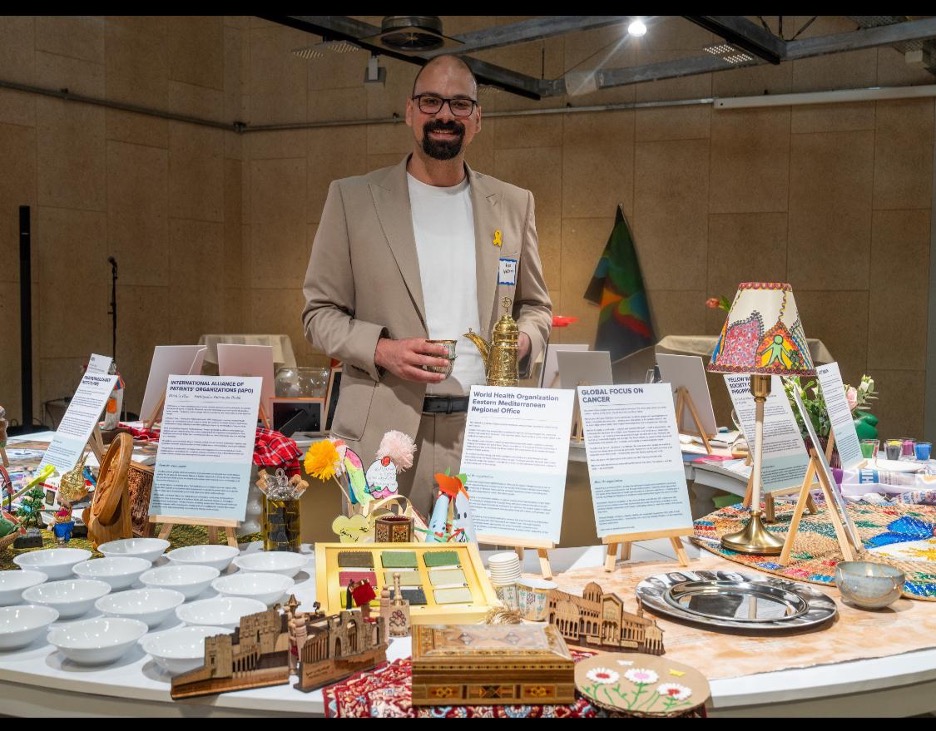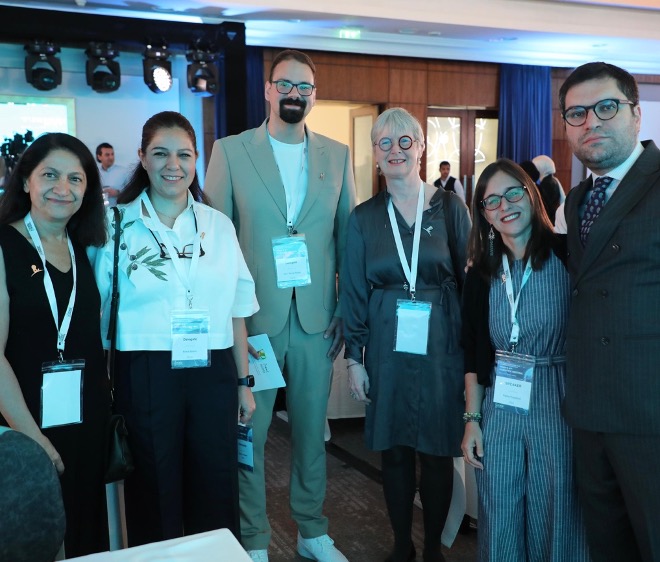HRIDAY
Leading an equitable response to NCDs in India
Meaningful Engagement of People with Lived Experiences
29 Jan 2026
Amr Sibai | 22 Jul 2025
About this SeriesThis article is part of the Lived Experience Perspectives Series, which features firsthand accounts from individuals living with noncommunicable diseases, mental health, or neurological conditions. Each piece highlights one of the key advocacy messages from the WHO Symposium on the Meaningful Engagement of People Living with NCDs, Mental Health, and Neurological Conditions, contributing to global advocacy efforts in the lead-up to the Fourth High-Level Meeting of the UN General Assembly on NCDs and Mental Health in September 2025. This article highlights Key Advocacy Message 2.3: Address barriers to participation by ensuring inclusive and equitable representation of people with lived experience across age groups, genders, and demographics. |
If someone had told me six years ago that cancer would not only change my life, but that a little child would transform my entire cancer journey, I would never have believed it.
When I was diagnosed with cancer, I was young, shocked, disappointed, and overwhelmed with fear. A cancer diagnosis is tough under any circumstances, but I was facing mine in Syria in 2019, in a country torn apart by war, where the healthcare system was fragile, under-resourced, and mere safety was a luxury that few could afford.
In Syria, people were already burdened with loss, poverty, and uncertainty. In our community, most people associate cancer with fear, dread and death. This fear wasn’t only about cancer itself; it was about isolation, hopelessness, and the overwhelming thought of facing a life-changing diagnosis in a place where access to affordable cancer treatment is often out of reach.
For me, one moment remains etched in my memory: the day I began my treatment journey. When I first entered the pediatric oncology unit, I saw a young child walking bravely through the hospital halls, carrying his chemotherapy monitor. Prior to this sight, I didn’t even know that children could have cancer,which made my own diagnosis as a child feel even more isolating. But seeing him gave me a profound sense of comfort and safety. Realizing that other children were going through the same thing made me feel less alone and showed me how powerful it is to be seen during difficult times. That single moment eased much of my fear and reshaped my entire cancer journey.

As I continued my treatment, I began engaging more with my doctors, nurses, and other children at the cancer center. I gradually found myself talking about my condition more openly because the people around me truly understood how I felt. These conversations became genuine moments of relief and support. I now believe that being close to others who share similar struggles can completely change one’s experience.
When my treatment ended, I began sharing my story with my close circle of family, friends, and colleagues. I noticed over time how people who were once afraid to even say the word cancer began to speak about it more openly and comfortably. I realized that sharing my story had normalized the perception of cancer and helped reduce the fear and stigma surrounding it. Seeing how impactful these conversations are, I decided to expand my work and began volunteering at Basma association, where I had received my cancer treatment. Basma is the only specialized organization in Syria supporting children with cancer and their families. I took part in organizing fundraising events such as marathons, bazaars and gala dinners to raise awareness about childhood cancers. I was also visiting hospitals where children were undergoing treatment and offered them support. Volunteering became a way to give back to the place that stood by me during my hardest days, and help other children overcome the challenges that I once faced.
During my visits, I met with many children receiving the same medications I once took. Knowing how much children dislike certain treatments, the first thing I often ask them about is how they’re feeling about the medication. They’re always surprised that I know exactly how challenging it is to deal with the side effects: the taste, the pain, the exhaustion. The moment they realize that someone older has gone through the same experience, their eyes light up with a sense of trust and comfort. When I explain how important the medication was in my own recovery, they become more willing to adhere to it.
Many children receiving cancer treatment also struggle with eating. But when I tell them that healthy eating habits helped me beat cancer, they start eating again – not just because they have to, but with new hope. Supporting patients as they process their emotions and sharing insights with healthcare providers can strengthen the patient-provider connection and enhance the treatment journey.
Being from Syria, I never imagined that I would be able to share my story and turn it into a message the whole world could hear. For many Syrians, even crossing the country's borders is a challenge - due to visa restrictions, political instability, and limited access to safe travel routes. It felt nothing short of a miracle to participate in international forums where I could highlight the challenges faced by children with cancer living in conflict settings.
In July 2024, I had the opportunity to attend a workshop in Syria that was organized by the World Health Organization’s Eastern Mediterranean Regional Office (WHO EMRO). The multistakeholder workshop focused on meaningful engagement and the pathways for operationalizing the WHO Framework for meaningful engagement of people living with NCDs, mental health and neurological conditions. Through discussions, I realized that my personal journey with cancer can be more than a mere story to support others going through the same challenges. It is a powerful professional tool that can be used to advocate for more inclusive policies for people living with cancer.
Later that year, I got another opportunity to participate in the World Cancer Congress 2024 in Geneva as a person with lived experience and an advocate for children with cancer. I met health leaders from around the world and engaged in strategic discussions about advancing people-centred care.

During a side-event at the 78th World Health Assembly, I also had the privilege of sharing the rich culture of my country during events focused on meaningful engagement and highlight the strength and resilience that I have experienced in our communities.

At the 3rd WHO Symposium on meaningful engagement of people with lived experience, I had the opportunity to speak about region-specific challenges of people living with cancer to a global audience.

Events like these have given me a platform to amplify the voices of those who might otherwise never have the chance to share their stories. In almost every international event I attend, I am the only Syrian participant. Comparing my journey to other Syrian children with cancer feels unfair. I was fortunate to receive my treatment in a safe place, but it does not have the capacity to treat all Syrian children due to a lack of funding and resources. I am privileged to hold dual citizenship, which allows me to attend international events that many fellow Syrians cannot, just because of where they were born.
Meaningful engagement is not about working for patients, it's about working with them. Every event I attend strengthens my belief that when people with lived experience are given a seat at the decision-making table, the outcomes can be profoundly different.
Having gained a deeper understanding of meaningful engagement, I now strongly advocate for creating opportunities and safe environments where individuals from marginalized and underrepresented communities can share their experiences. These spaces are essential for healing and for fighting stigma and discrimination.
Far too many people are underrepresented in international forums because they’ve been excluded from opportunities simply due to their nationality. We must empower these voices by engaging with them sincerely and providing them with a platform to speak up, because their perspectives truly matter.
I call on the global community to collaborate in building a future where all cancer patients can contribute meaningfully to decisions that directly affect their lives. We must break down barriers to participation and ensure inclusive and equitable representation of people with lived experience across age groups, genders, and demographics in global policy forums and platforms. Establishing a safe and inclusive environment where survivors and healthcare providers can meet and listen to one another is equally important. Our voices are not just stories - they are strategies for building better healthcare systems.
Amr Sibai is a Syrian cancer survivor and advocate for children with cancer. His lived experience has shaped his work in psychosocial support, advocacy, and meaningful engagement in health systems. He volunteers at Basma, an association supporting children with cancer and their families in Syria, and works as a coordinator for White Hands, which delivers emergency aid and fosters lasting change for Syrian families. Amr has contributed to advancing meaningful engagement across various international platforms. He is dedicated to advancing equity in cancer care and ensuring that the voices of those most affected are heard and included at all policy levels.